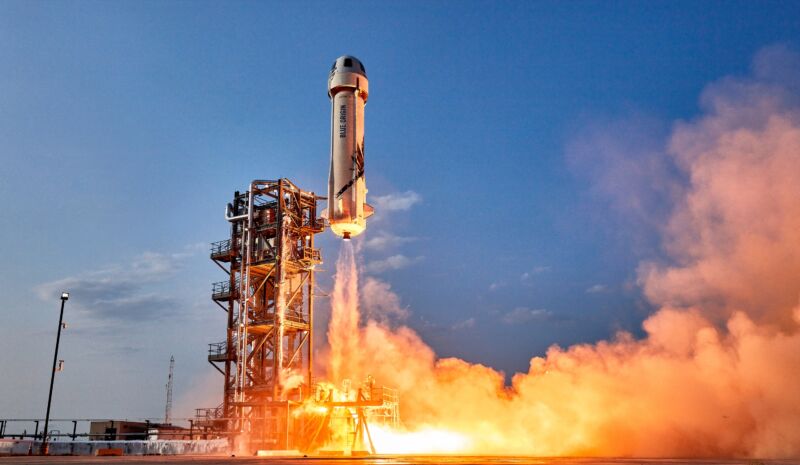
Enlarge / Blue Origin’s New Shepard launch system consists of a booster and a capsule.
Blue Origin is finally returning to flight.
On Tuesday the company announced, via the social media site X, that its New Shepard spacecraft would launch no earlier than next Monday.
“We’re targeting a launch window that opens on Dec. 18 for our next New Shepard payload mission,” the company stated. “#NS24 will carry 33 science and research payloads as well as 38,000 @clubforfuture postcards to space.”
The uncrewed New Shepard 24 test flight will refly the science payloads that were aboard the New Shepard 23 flight, which experienced an engine nozzle failure at 1 minute and 4 seconds following liftoff in September 2022. The capsule’s emergency escape system performed as intended, rapidly pulling the spacecraft away from the disintegrating rocket and allowing Blue Origin to recover the payloads flown for NASA and other customers.
Blue Origin finished its accident analysis this spring and implemented a fix to the problem, including design changes to the BE-3 engine combustion chamber. In May, the company said it planned to return to flight “soon.” Then, in September, the Federal Aviation Administration closed its mishap investigation.
The company originally targeted an uncrewed return-to-flight mission in early October; however, two sources told Ars that the additional two-month delay was caused by an issue with certifying an engine part intended for flight.
A new rocket?
Blue Origin has not specified which rocket and spacecraft will be flying next week from its launch site in West Texas, near the town of Van Horn. The company’s first New Shepard rocket, Booster 1, was lost during an April 2015 flight. Booster 2 was retired in October 2016 after performing a successful test of the launch escape system on its fifth and final flight. Booster 3, which was lost during the NS-23 mission in September, was the company’s oldest operational rocket, making its debut in December 2017.
The company has used its newest rocket, Booster 4, exclusively for human launches on New Shepard. This rocket has some modifications from Booster 3 to qualify it as a human-rated rocket. The company has also built a fifth booster that may be making next Monday’s flight.
Tuesday’s announcement came amid a tidal wave of changes in leadership at Blue Origin this month, with several high-profile retirements and the arrival of its new chief executive, who has come to the company from Amazon, Dave Limp. He replaced Bob Smith, who had an uneven tenure as leader of Blue Origin. As Ars reported last month, Limp is likely evaluating the long-term prospects of New Shepard, which remains far from breaking even financially.
The company may pivot toward its larger projects, including the New Glenn rocket and lunar lander for the Artemis program, which have a greater chance of raising significant revenue. Amazon founder Jeff Bezos has funded Blue Origin out of his pocket, providing as much as $2 billion a year in operating expenses.
However, given the announcement of New Shepard’s return to flight, it’s clear that Blue Origin isn’t moving entirely away from New Shepard just yet.